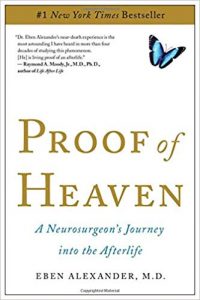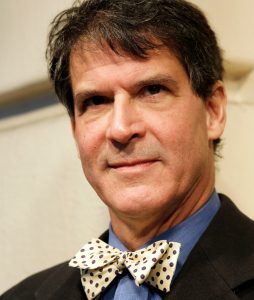Proof of Heaven, Eben Alexander M.D., USA, 2012
 In his book, neurosurgeon Alexander tells how, in November 2008, completely out of the blue, he contracted a type of meningitis that is related to E.coli bacteria. In spite of the best medical care available, he quickly slipped into a coma. The prognosis was that he would not survive and that if by some miracle he did survive he would be little more than a vegetable.
In his book, neurosurgeon Alexander tells how, in November 2008, completely out of the blue, he contracted a type of meningitis that is related to E.coli bacteria. In spite of the best medical care available, he quickly slipped into a coma. The prognosis was that he would not survive and that if by some miracle he did survive he would be little more than a vegetable.
His brain was technically ‘dead’. The bacteria had attacked the neocortex (responsible for sensory perception, cognition, generation of motor commands, spatial reasoning and language), and all tests showed that there was absolutely nothing happening in that area of his brain.
However, after seven days, Alexander unbelievably returned to life, and he was able to relate the amazing journey he had made into the world beyond this one. Even without language Alexander was able to absorb knowledge and an overwhelming feeling of love and contentment; on his return to life he admitted that he did not have the words to describe the beauty and the emotions he had encountered ‘on the other side’.
Many have described Alexander’s experience as a NDE (near-death experience) brought on by the trauma of his illness and/or strong medications; however – and this is the critical point and the very essence of Alexander’s argument – Alexander’s brain was, to all intents and purposes, completely dead. This means that physically (even while undergoing trauma or medication) he was unable to perceive, remember, analyse and/or experience anything at all.

Based on Alexander’s experience, it must, therefore, be argued that consciousness is not related to the brain (as previously believed) but that it exists outside of our physical self. As Alexander writes: ‘My experience showed me that the death of the body and the brain are not the end of consciousness, that human experience continues beyond the grave.’ (9)
It is this sentence that is one of the most important sentences in the whole book as it turns everything we have believed or accepted in regards to life after death upside down. If we are to believe Alexander, there is most definitely a life after death.
Alexander is not without his detractors, but whether or not it is possible to scientifically explain the neurosurgeon’s experience is debatable. It would, of course, be wonderful if Alexander’s theory, based on his own experience, could eventually be proven to be correct; however, in the meantime, read the book and make up your own mind.
The photo of Alexander is from nytimes.com